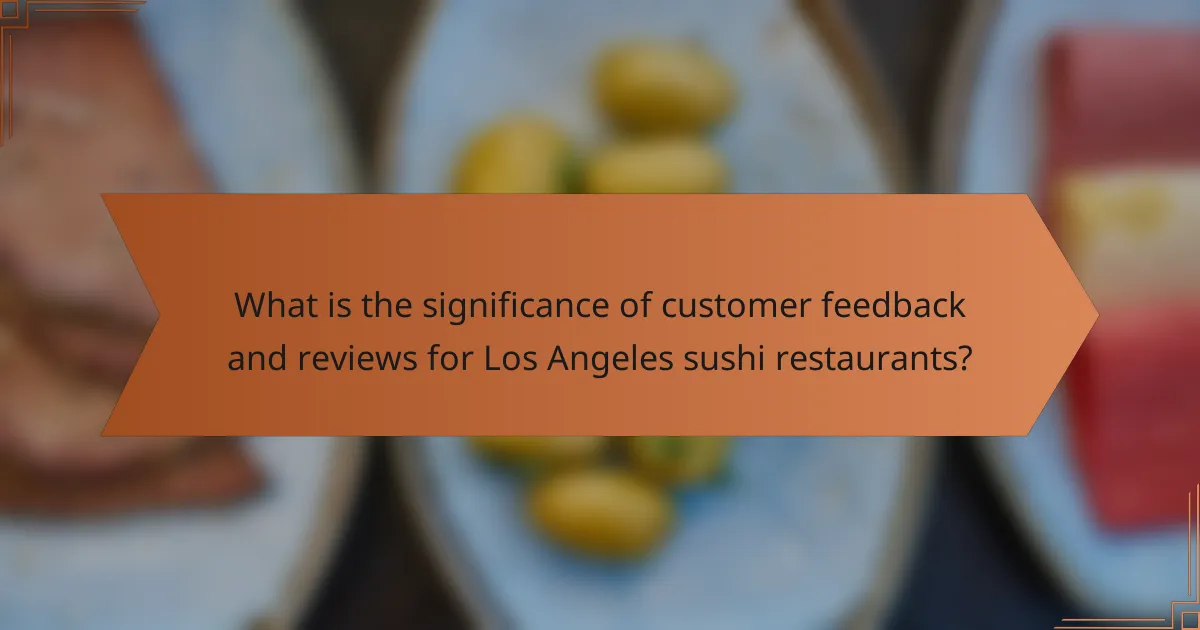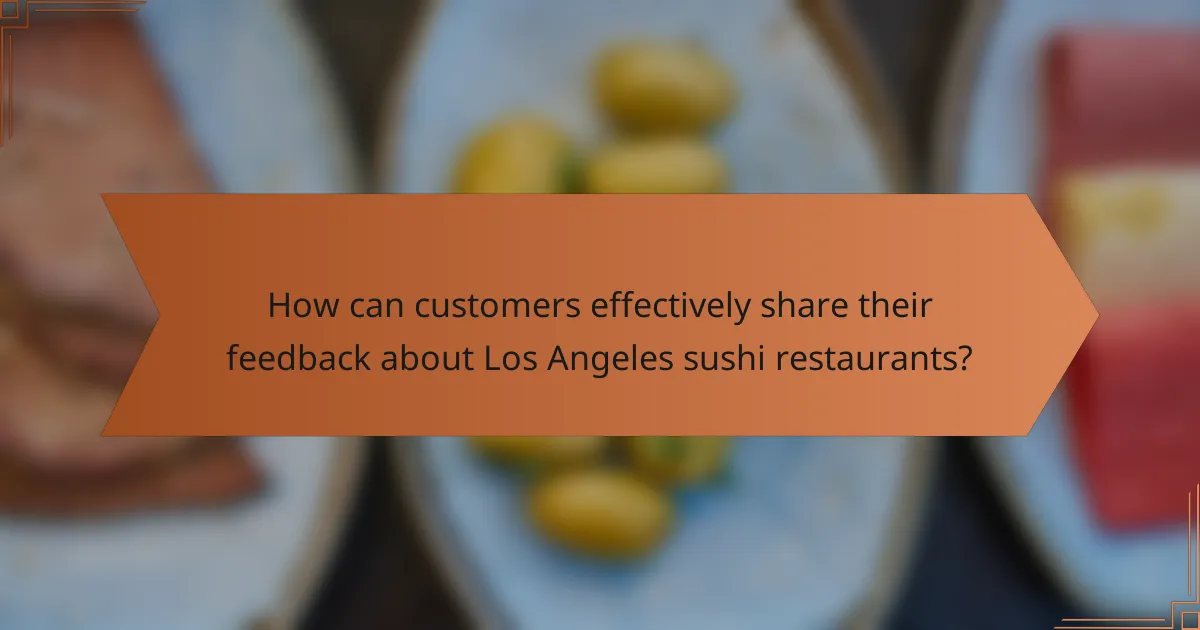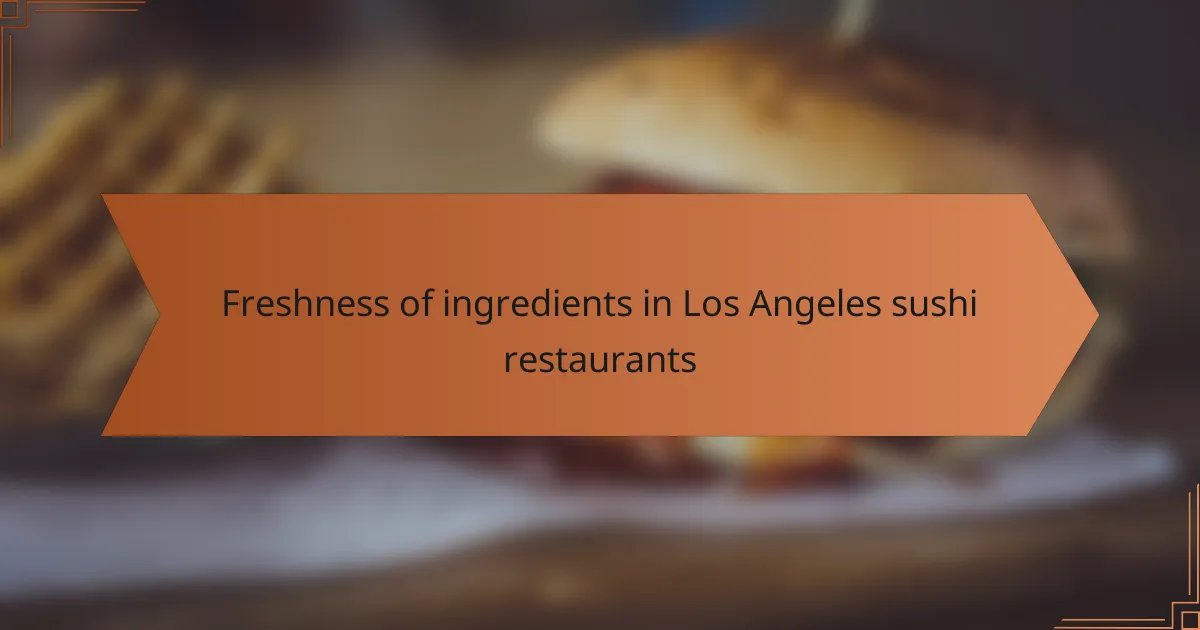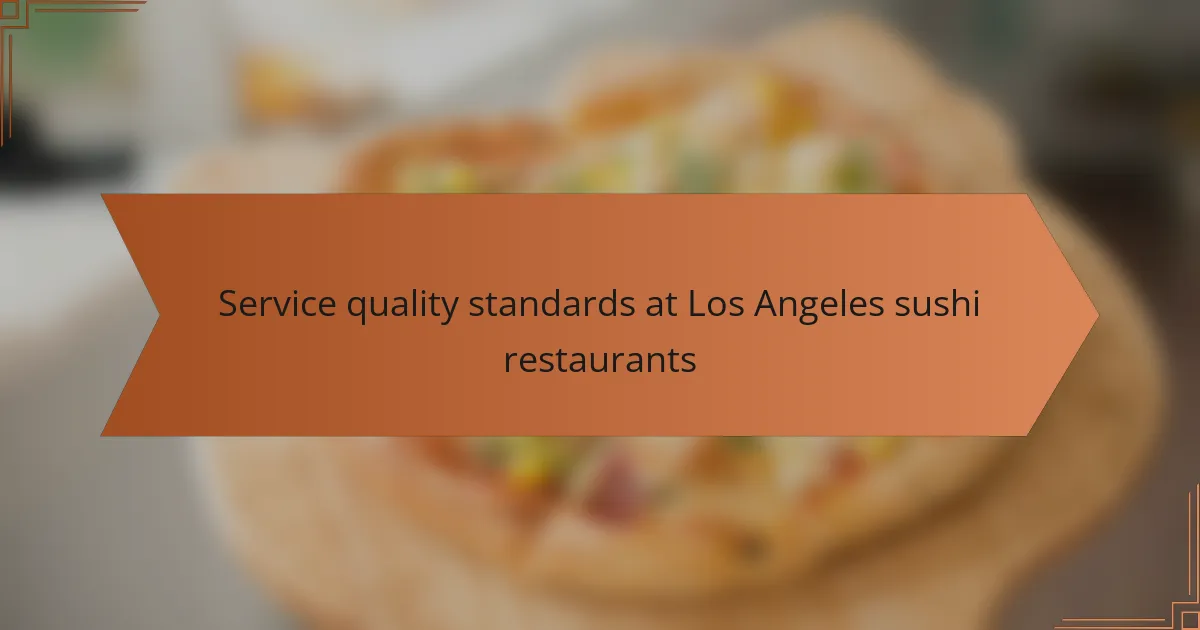Customer feedback and reviews are essential for sushi restaurants in Los Angeles, influencing their reputation and customer attraction. Positive reviews enhance a restaurant’s image, while negative feedback identifies areas for improvement. Popular sushi establishments like Sushi Gen, Sugarfish, and KazuNori are highlighted for their quality and customer satisfaction. Online platforms such as Yelp and Google Reviews facilitate customer feedback, making it crucial for restaurants to maintain a positive online presence. The article emphasizes the significant role of customer reviews in shaping dining experiences and guiding restaurant enhancements.

What is the significance of customer feedback and reviews for Los Angeles sushi restaurants?
Customer feedback and reviews are crucial for Los Angeles sushi restaurants. They provide insights into customer preferences and dining experiences. Positive reviews can enhance a restaurant’s reputation and attract new customers. Conversely, negative feedback highlights areas needing improvement. Many consumers rely on online reviews when choosing dining options. According to a survey by BrightLocal, 82% of consumers read online reviews for local businesses. This statistic underscores the importance of maintaining a positive online presence. Additionally, feedback can guide menu adjustments and service enhancements. Overall, customer reviews significantly influence the success of sushi restaurants in Los Angeles.
How do customer reviews impact the reputation of sushi restaurants in Los Angeles?
Customer reviews significantly impact the reputation of sushi restaurants in Los Angeles. Positive reviews enhance the restaurant’s credibility and attract more customers. High ratings often lead to increased visibility on platforms like Yelp and Google. Conversely, negative reviews can deter potential diners and damage the restaurant’s image. Research indicates that 84% of people trust online reviews as much as personal recommendations. Additionally, a one-star increase in Yelp rating can lead to a 5-9% increase in revenue for restaurants. Therefore, customer feedback plays a crucial role in shaping public perception and driving business success for sushi restaurants in the area.
What role do online platforms play in gathering customer feedback?
Online platforms serve as crucial tools for gathering customer feedback. They facilitate direct communication between customers and businesses. Customers can easily share their experiences and opinions on these platforms. This feedback can include ratings, reviews, and comments. Businesses can access this information in real-time. According to a 2021 survey by BrightLocal, 87% of consumers read online reviews for local businesses. This statistic highlights the significance of online platforms in influencing customer decisions. Additionally, feedback collected online can inform business improvements and service enhancements.
How can positive and negative reviews influence customer decisions?
Positive and negative reviews significantly influence customer decisions. Positive reviews can enhance a restaurant’s reputation and attract more customers. Customers often rely on these reviews to gauge quality and service. A study by BrightLocal found that 79% of consumers trust online reviews as much as personal recommendations. Negative reviews, on the other hand, can deter potential customers. They highlight issues that may lead to poor experiences. According to a survey by ReviewTrackers, 94% of consumers reported avoiding a business due to negative reviews. Thus, both types of reviews play a critical role in shaping customer perceptions and choices.
What are the common themes found in customer feedback about Los Angeles sushi restaurants?
Common themes in customer feedback about Los Angeles sushi restaurants include freshness, quality of ingredients, and service. Customers frequently praise the freshness of the fish used in sushi dishes. Many reviews highlight the high-quality ingredients that enhance the overall dining experience. Service quality is another recurring theme, with patrons noting attentive and friendly staff. Additionally, ambiance and cleanliness are often mentioned as important factors. Price-value ratio is also a common point of discussion, with customers expressing opinions on whether the cost aligns with their expectations. Overall, these themes reflect customer priorities when dining at sushi restaurants in Los Angeles.
Which attributes do customers frequently mention in their reviews?
Customers frequently mention freshness, taste, and service in their reviews of Los Angeles sushi restaurants. Freshness is often highlighted as a key factor in the quality of sushi. Many reviews note that fresh ingredients enhance the overall dining experience. Taste is another commonly praised attribute. Customers frequently comment on the balance of flavors and the creativity of the dishes. Service quality is also a recurring theme in reviews. Patrons often appreciate attentive and knowledgeable staff. These attributes collectively contribute to the overall satisfaction of customers dining at these establishments.
How do customers rate the quality of sushi compared to other factors?
Customers typically rate the quality of sushi highly compared to other factors. Quality often ranks as the most critical attribute in sushi reviews. Many customers prioritize freshness and taste above all else. A survey indicated that 85% of sushi enthusiasts consider quality the top factor. Additionally, ambiance and service follow in importance but are secondary to sushi quality. Customers frequently cite specific attributes like fish freshness and presentation. In contrast, factors such as price and location are rated lower. Overall, sushi quality remains the primary concern for most diners.
Why is it important for sushi restaurants to respond to customer feedback?
It is important for sushi restaurants to respond to customer feedback to enhance customer satisfaction. Engaging with feedback shows that restaurants value their customers’ opinions. This interaction can lead to improved service and menu offerings. Positive responses can build customer loyalty and encourage repeat visits. Addressing negative feedback can help resolve issues and prevent loss of business. Research indicates that businesses that respond to reviews can increase their ratings by up to 1.7 stars on average. This is crucial in a competitive market like Los Angeles, where customer reviews significantly influence dining choices.
What strategies can restaurants use to effectively address negative reviews?
Restaurants can effectively address negative reviews by responding promptly and professionally. Acknowledging the customer’s experience shows that the restaurant values feedback. Offering a solution or compensation can help to rectify the situation. Encouraging offline communication can prevent further public dissatisfaction. Training staff to handle complaints can improve future interactions. Monitoring review platforms regularly helps in identifying issues early. Implementing changes based on feedback demonstrates commitment to improvement. According to a 2021 survey by BrightLocal, 89% of consumers read responses to reviews, highlighting the importance of engagement.
How can responding to feedback enhance customer loyalty?
Responding to feedback enhances customer loyalty by showing customers that their opinions matter. When businesses acknowledge feedback, they build trust and rapport with their customers. This engagement can lead to increased satisfaction and a stronger emotional connection. According to a study by Microsoft, 70% of consumers say they feel more loyal to a brand that actively seeks their feedback. Additionally, businesses that respond to feedback can identify areas for improvement, leading to better services and products. This proactive approach can result in repeat business and positive word-of-mouth referrals. Overall, responding to feedback fosters a sense of community and loyalty among customers.

What are the most popular sushi restaurants in Los Angeles based on customer reviews?
Sushi Gen, Sugarfish, and KazuNori are among the most popular sushi restaurants in Los Angeles based on customer reviews. Sushi Gen is praised for its fresh fish and traditional preparation. Sugarfish is known for its quality and simplicity in sushi offerings. KazuNori specializes in hand rolls and has garnered a loyal following. Customer reviews consistently highlight the quality of ingredients and the overall dining experience at these establishments.
How do customer ratings vary among different sushi restaurants in Los Angeles?
Customer ratings among different sushi restaurants in Los Angeles vary significantly. Some restaurants receive ratings above 4.5 stars on platforms like Yelp and Google Reviews. For instance, high-end sushi establishments often achieve these ratings due to quality ingredients and exceptional service. Conversely, more casual sushi spots may have ratings closer to 3.5 stars. Factors influencing these ratings include food quality, ambiance, and customer service. Additionally, popular chains might receive mixed reviews, reflecting consistency issues. Overall, the variation in ratings highlights diverse customer experiences across the sushi restaurant landscape in Los Angeles.
What factors contribute to the high ratings of certain sushi establishments?
High ratings of certain sushi establishments are influenced by factors such as quality of ingredients, skilled chefs, and exceptional service. Freshness of fish is crucial; establishments that source high-quality, sustainable seafood often receive better reviews. The expertise of chefs impacts the flavor and presentation of dishes. Restaurants with chefs trained in traditional sushi-making techniques tend to stand out. Additionally, attentive and friendly service enhances the dining experience, leading to positive customer feedback. Cleanliness and ambiance also play significant roles in customer satisfaction. Establishments that maintain a welcoming atmosphere often achieve higher ratings. Finally, unique menu offerings can attract diners, as innovative dishes may enhance overall appeal.
How do customer reviews highlight the strengths and weaknesses of these restaurants?
Customer reviews highlight the strengths and weaknesses of restaurants by providing firsthand accounts of dining experiences. Positive reviews often emphasize quality of food, service, and ambiance. For instance, customers might praise fresh ingredients or attentive staff. Conversely, negative reviews typically point out issues like long wait times or subpar meals. Reviews serve as a platform for customers to express satisfaction or disappointment. According to a 2021 survey by BrightLocal, 87% of consumers read online reviews for local businesses. This statistic underscores the influence of customer feedback on restaurant reputation. Overall, reviews create a transparent dialogue between customers and restaurants, revealing areas for improvement and celebration.
What types of sushi do customers rave about in Los Angeles?
Customers in Los Angeles rave about a variety of sushi types. Popular choices include nigiri, sashimi, and specialty rolls. Nigiri, which features a slice of fish atop a mound of rice, is often praised for its simplicity and flavor. Sashimi, consisting of thinly sliced raw fish, is celebrated for its freshness and quality. Specialty rolls, such as the California roll or spicy tuna roll, are favorites for their creativity and taste. Many reviews highlight the quality of ingredients used in these sushi types. Customers frequently mention the vibrant flavors and presentation as key factors in their satisfaction.
Which sushi dishes receive the highest praise from customers?
Popular sushi dishes that receive the highest praise from customers include sushi rolls, sashimi, and nigiri. Customers frequently commend the Dragon Roll for its unique combination of eel and avocado. The Rainbow Roll is also highly rated for its colorful presentation and variety of fish. Sashimi, particularly salmon and tuna, is praised for its freshness and quality. Nigiri, especially with wasabi and fresh fish, garners positive reviews for its simplicity and flavor. These dishes often appear in customer feedback as favorites in Los Angeles sushi restaurants.
How do seasonal ingredients affect customer preferences?
Seasonal ingredients significantly influence customer preferences in Los Angeles sushi restaurants. Customers often seek freshness and quality, which seasonal ingredients provide. For example, fish like salmon and tuna are more abundant and flavorful during specific seasons. This abundance can lead to increased customer satisfaction and loyalty. Additionally, seasonal ingredients often reflect local culinary trends. In Los Angeles, where food culture is diverse, seasonal offerings can attract customers looking for unique dining experiences. Research shows that menus featuring seasonal ingredients can boost sales by up to 20%. This trend highlights the importance of seasonal ingredients in shaping customer choices.
What role do social media platforms play in shaping customer opinions about sushi restaurants?
Social media platforms significantly influence customer opinions about sushi restaurants. They provide a space for users to share experiences and reviews. Customers post photos of dishes, which visually attract potential diners. Positive reviews can enhance a restaurant’s reputation, while negative feedback can deter customers. Platforms like Instagram and Yelp allow for immediate interaction and feedback. According to a study by BrightLocal, 79% of consumers trust online reviews as much as personal recommendations. This trust affects dining choices and perceptions of quality. Social media also facilitates community engagement, fostering loyalty among sushi restaurant patrons.
How can restaurants leverage social media feedback to improve their offerings?
Restaurants can leverage social media feedback to enhance their offerings by actively monitoring and analyzing customer comments. They can identify trends in customer preferences and dissatisfaction. For instance, if multiple patrons mention a specific dish being too salty, restaurants can adjust the recipe accordingly. Engaging with customers directly on social media fosters a sense of community and shows that their opinions matter. Furthermore, positive feedback can be highlighted in marketing materials to attract new customers. According to a study by the National Restaurant Association, 70% of consumers trust online reviews as much as personal recommendations. This statistic underscores the importance of addressing feedback to build a positive reputation. By implementing changes based on social media insights, restaurants can improve customer satisfaction and loyalty.
What are the risks of ignoring social media reviews?
Ignoring social media reviews can lead to significant risks for businesses. Customers often rely on these reviews to make informed decisions. Negative reviews can deter potential customers and harm a restaurant’s reputation. A study by BrightLocal found that 87% of consumers read online reviews for local businesses. Additionally, 73% of consumers trust a business more if it has positive reviews. Failing to address negative feedback can result in lost sales and decreased customer loyalty. Moreover, ignoring reviews may prevent businesses from identifying areas needing improvement. In the competitive landscape of Los Angeles sushi restaurants, this oversight can be detrimental to success.

How can customers effectively share their feedback about Los Angeles sushi restaurants?
Customers can effectively share their feedback about Los Angeles sushi restaurants through online review platforms. Websites like Yelp and Google Reviews allow users to post detailed evaluations. Customers can rate their experience and provide comments on food quality, service, and ambiance. Social media platforms also serve as effective channels for sharing opinions. Users can tag restaurants in posts or stories to reach a wider audience. Direct feedback to restaurant management via email or comment cards is another option. According to a 2021 survey by BrightLocal, 87% of consumers read online reviews for local businesses. This highlights the importance of sharing feedback for restaurant visibility and improvement.
What platforms are best for leaving reviews of sushi restaurants?
Yelp, Google Reviews, and TripAdvisor are the best platforms for leaving reviews of sushi restaurants. Yelp is widely used for restaurant reviews and provides detailed feedback options. Google Reviews integrates with Google Maps, making it easy for users to leave reviews directly. TripAdvisor focuses on travel-related content, offering insights into dining experiences. These platforms collectively reach a large audience, influencing potential customers.
How can customers ensure their feedback is constructive?
Customers can ensure their feedback is constructive by being specific and objective. They should describe their experience clearly, mentioning particular dishes or services. Avoiding vague statements helps convey the message effectively. Using a respectful tone promotes a positive dialogue. Customers should focus on both positive aspects and areas for improvement. Providing suggestions for enhancement can be beneficial. Including relevant details, such as service time or food quality, adds context. Constructive feedback often leads to better customer experiences in the future.
What tips can customers follow to write impactful reviews?
Customers can write impactful reviews by being specific and honest. They should describe their experience in detail. Mentioning specific dishes enhances clarity. Customers should also include the atmosphere of the restaurant. Discussing service quality adds valuable insights. Using a balanced approach between pros and cons is important. Including personal anecdotes can make reviews relatable. Writing in a clear and concise manner improves readability. Reviews with a personal touch often resonate more with readers.
What are the best practices for sushi restaurants to gather and analyze customer feedback?
Sushi restaurants can effectively gather and analyze customer feedback by implementing several best practices. First, they should utilize digital platforms such as online surveys and social media. These platforms allow for easy access and quick responses from customers.
Second, in-person feedback can be collected through comment cards at tables. This method encourages immediate responses while dining. Third, sushi restaurants should actively engage with online reviews on sites like Yelp and Google. Responding to reviews shows customers that their opinions are valued.
Fourth, staff training is essential for encouraging feedback during service. Well-trained staff can prompt customers to share their experiences. Fifth, analyzing feedback trends over time can help identify areas for improvement. This analysis can include tracking common themes in comments or ratings.
Lastly, offering incentives for feedback, such as discounts or loyalty points, can increase participation. A study by the American Customer Satisfaction Index found that businesses actively seeking feedback see higher customer satisfaction and retention rates.
How can restaurants utilize surveys to gain insights from customers?
Restaurants can utilize surveys to gain insights from customers by collecting structured feedback on their dining experiences. Surveys can assess customer satisfaction, menu preferences, and service quality. This data helps restaurants identify strengths and areas for improvement. For example, a survey question about favorite dishes can guide menu development. Additionally, customer feedback on service speed can inform staff training. Research shows that 70% of customers who receive follow-up surveys feel more valued. This engagement can enhance customer loyalty and retention. Overall, surveys are a valuable tool for restaurants to understand customer needs and improve offerings.
What methods can be employed to track and respond to customer feedback?
Surveys and feedback forms can be employed to track customer feedback. These tools allow businesses to gather direct insights from customers. Online platforms can also be used to collect reviews and ratings. Monitoring social media channels helps in understanding customer sentiments. Customer service interactions provide valuable feedback opportunities. Analyzing website analytics can reveal customer behavior trends. Utilizing customer relationship management (CRM) systems can streamline feedback tracking. Implementing a feedback loop ensures businesses respond effectively to customer input.
What practical tips can customers follow to enhance their dining experience at sushi restaurants?
To enhance their dining experience at sushi restaurants, customers can follow several practical tips. First, they should familiarize themselves with the menu. Understanding different types of sushi and their ingredients can improve selection. Second, customers should consider the seasonality of fish. Fresh fish varieties can elevate the overall experience. Third, ordering a variety of dishes is advisable. This allows for a broader tasting experience. Fourth, it is beneficial to pair sushi with appropriate beverages. Sake or green tea can complement flavors effectively. Fifth, customers should engage with the sushi chef. Asking questions can lead to personalized recommendations. Lastly, practicing proper etiquette enhances the experience. Using chopsticks correctly and expressing appreciation is respectful. These tips can significantly improve the overall dining experience at sushi restaurants.
The main entity of this article is customer feedback and reviews related to sushi restaurants in Los Angeles. The article explores the significance of customer reviews in shaping restaurant reputations, influencing dining choices, and guiding service improvements. It highlights common themes in feedback, such as freshness and service quality, while emphasizing the role of online platforms in gathering insights. Additionally, the article discusses strategies for restaurants to effectively respond to feedback and enhance customer loyalty, alongside practical tips for customers to improve their dining experiences. Overall, the content underscores the critical impact of customer reviews on the success of sushi establishments in Los Angeles.



